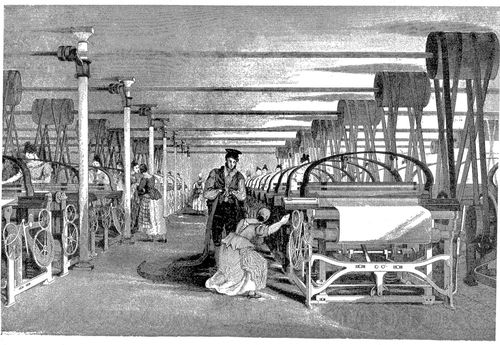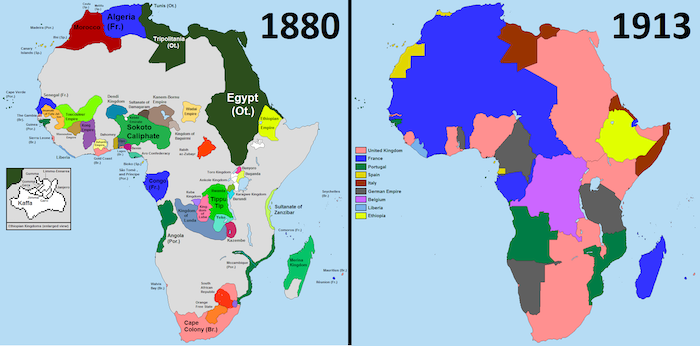AP World History: Modern 🌍
577 resourcesSee Units
Answers and Review for Multiple Choice Practice on Consequences of Industrialization

Image From Wikipedia
⛔STOP!⛔ Before you look at the answers make sure you gave this practice quiz a try so you can assess your understanding of the concepts covered in unit 6. Click here for the practice questions: AP World Unit 6 Multiple Choice Questions.
Facts about the test: The AP World History exam has 55 multiple-choice questions and you will be given 60 minutes to complete the section. That means it should take you around 15 minutes to complete 15 questions.
*The following questions were not written by CollegeBoard and although they cover information outlined in the AP World History Course and Exam Description the formatting of the exam may be different.
1. Which statement best expresses the motive for 19th-century European imperialism?
A. Living space was needed for the excess population in Western Europe.
B. Imperialism would benefit the economies of the colonial powers.
C. European nations would benefit from some aspects of the conquered nation’s culture.
D. European leaders believed imperialism was an effective method of reducing the number of wars.
Answer: One of the main motivations for European imperialism in the 19th century was to find raw materials and markets for continued industrial production. Economics drove this New Imperialism.
📄 Study AP World, Unit 6.1: Rationales for Imperialism
2. During the 18th and 19th centuries, increased contact between European and the continents of Africa, Asia, and South America resulted in
A. the exploitation of the labor and resources of these continents
B. closer cultural cooperation between Europe and these continents
C. a return to the political and economic systems of feudal Europe
D. preservation of the rights of the indigenous peoples
Answer: While initially, especially with the BEIC in India, some Europeans did respect various aspects of indigenous culture, this was not the norm. Most of the time, Europeans' sense of cultural superiority led to a complete disregard for native cultures, and the exploitation of native peoples in order to extract natural resources.
📄 Study AP World, Unit 6.2: Expansion of Imperialism
3. During the 18th and 19th centuries, Europeans improved roads and bridges and built railroads in their colonies primarily to
A. impress the colonists with their technological knowledge
B. help missionaries spread Christianity
C. provide jobs for the colonists
D. obtain raw materials needed for industrialization
Answer: In some colonial holdings, the Europeans did build up infrastructure such as dams, roads, and railroads. However, the primary reason for this build up was not to help the indigenous populations; all of this building was designed to facilitate easier transportation of raw materials, back to the mother country.
📄 Study AP World, Unit 6.4: Global Economic Development from 1750-1900
4. The idea that stronger nations had the right to overtake weaker nations, based on laws of nature, is the definition of
A. Colonialism
B. Nationalism
C. Imperialism
D. Social Darwinism
Answer: Charles Darwin's idea of "survival of the fittest" in nature was used as justification for European nations overtaking other nations or continents, such as India and Africa. The Europeans reasoned that taking over these areas would just make the world "stronger" just as killing out the weaker species in nature did the same.
📄 Study AP World, Unit 6.1: Rationales for Imperialism
5. The Sepoy Rebellion is considered an important event in Indian history because it was one cause of
A. The British government taking more control over India
B. The establishment of French colonies in India
C. The creation of the Mughal Empire by Muslims
D. India finally gaining its independence from Britain
Answer: When the Sepoys mutinied against British forces, it was due to the lack of respect the British were showing to Indians, among other things. The Brits saw the mutiny as the BEIC not being able to control its own troops and officials, so the British government chose to intervene and take greater control over India, the crown jewel for Britain. Thus began the British Raj.
📄 Study AP World, Unit 6.3: Indigenous Reponses to Imperialism
6. The major incentive for British control over India was
A. To prevent the Dutch colonizing any part of Asia
B. To increase Christianity in Asia
C. Access to valuable natural resources
D. To engage in more cultural diffusion with the South Asian subcontinent
Answer: One of the main reasons that Britain wanted control of India was due to three very valuable resources: cotton, tea, and opium. Cotton would continue to fuel textile production in Britain, while tea and opium would be used as very valuable exports to other nations.
7. Early European exploration of Africa, prior to 1800, was hindered by the
A. Isolationist policies of European monarchs
B. Challenging geography and disease
C. Alliances between African kingdoms that led to formidable resistance
D. A lack of contact with Africa prior to 1800
Answer: While the Europeans had a lot of contact with coastal regions in Africa, getting into the interior was much more challenging due to intense rainforests, and hard-to-navigate rivers. As well, malaria and yellow fever were deadly to Europeans, so exploration of the interior had to wait until these problems could be solved.
📄 Study AP World, Unit 6.2: Expansion of Imperialism

Image Courtesy of Khan Academy
8. Many of the political divisions shown on this map were directly related to the
A. Meiji Restoration
B. Boer War
C. Opium Wars
D. Berlin Conference
Answer: The division of African continent, as you see on this map, was a result of the Berlin Conference of 1884. At this conference, European powers carved up Africa into their own territorial possessions, in order to avoid war with other Europeans, while gaining access to valuable natural resources.
📄 Study AP World, Unit 6.2: Expansion of Imperialism
9. The 19th-century term “White Man’s Burden”, along with the idea of Social Darwinism reflect:
A. Europeans had a responsibility to "improve" and civilize the lives of the colonial peoples
B. Asians and Africans would be grateful for European help
C. Imperialism was opposed by most Europeans
D. Asians and Africans were equal to Europeans
Answer: Ideas such as Social Darwinism and White Man's Burden were based on the notion that Europeans were a more evolved and civilized group, and therefore superior. It was then the duty, or "burden" of the white man to help "bring up" those who were less civilized. Many Europeans used this as a justification of imperialism.
10. In China, the building of the Great Wall, the use of the tribute system, and the government’s support of rebellion are examples of attempts by different dynasties to limit
A. Foreign influence
B. Industrialization
C. Spread of Buddhism
D. The spread of socialist ideas
Answer: An enduring attitude of most Chinese dynasties was ethnocentrism, the belief in the superiority of Chinese culture. Often times, this attitude manifested itself in actions that were meant to limit, or prevent, foreign influence in China. This is why the Great Wall was built, why the Qing Dynasty will support Rebellion, in hopes of kicking out foreign and Christian influence in China.
11. What was the principal reason for the success of European colonialism in Asia in the late 1800s?
A. Many Asians adopted European religious practices
B. Europe was able to dominate military relations with Asia
C. Europeans respected Asian laws and customs.
D. Asians respected Europeans as representatives of an advanced civilization.
Answer: One of the reasons why Europeans were successful in creating economic empires in Asia was due to the fact that they had more modernized military technology that the Asian nations simply did not have.
📄 Study AP World, Unit 6.1: Rationales for Imperialism
12. The Sepoy Rebellion was to India as the Boxer Rebellion was to
A. Japan
B. Africa
C. China
D. India
Answer: The Boxer Rebellion in China was a response to foreign influence and Christian missionary efforts in China. It was similar to the Sepoy Rebellion in that it was a violent method meant to kick out foreign influence, as foreigners were not respecting traditional cultural practices and beliefs.
13. Japan resisted modernization for most of its history. What motivated Japan to modernize beginning in the 1800s?
A. Japanese military leaders admired the design of Commodore Perry’s fleet of steamships.
B. The Japanese people developed a previously unknown desire for Western goods
C. The Japanese leadership feared that if it did not modernize, it might be controlled by Western nations like China had been.
D. China threatened to attack Japan, so modern weapons were required for defense
Answer: When Commodore Matthew Perry hit the shores of Japan with his fleet of modern ships, Japan realized they were in a similar position to what China found themselves in at the beginning of the Opium Wars. Not wanting to find themselves in the same boat (get it?!) as China, the Japanese decided they would fight fire with fire, by modernizing.
14. The name of the process of Japanese modernization was the
A. Meiji Restoration
B. Edo Period
C. Sino-Japanese Industrialization
D. Shogunate Revival
Answer: The industrialization and modernization movement taken by the Japanese in the latter half of the 19th century was called the Meiji Restoration, named after the new emperor of Japan, Emperor Meiji.
What can we help you do now?
Browse Study Guides By Unit
🐎Unit 1 – The Global Tapestry, 1200-1450
🐫Unit 2 – Networks of Exchange, 1200-1450
🕌Unit 3 – Land-Based Empires, 1450-1750
🍕Unit 4 – Transoceanic Interactions, 1450-1750
✊🏽Unit 5 – Revolutions, 1750-1900
🚂Unit 6 – Consequences of Industrialization, 1750-1900
💣Unit 7 – Global Conflict, 1900-Present
🥶Unit 8 – Cold War & Decolonization, 1900-Present
✈️Unit 9 – Globalization, 1900-Present
✏️Frequently Asked Questions
🤔Exam Skills
👉🏼Subject Guides
📝AMSCO Notes

Fiveable
Resources
© 2025 Fiveable Inc. All rights reserved.